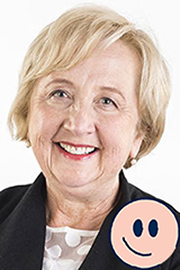President speech: Using human rights to inform administrative decision-making
The right to non-discrimination on the basis of sex and immigration regulations: Abdulaziz, Cabales and Balkandali v The United Kingdom (28 May 1985) Eur Court HR
The right to non-discrimination on the basis of sex and immigration regulations: Abdulaziz, Cabales and Balkandali v The United Kingdom (28 May 1985) Eur Court HR
As many of you know, for over a decade Dr Kidd has been a tenacious and dedicated advocate for the rights of Indigenous people. She has focused especially on the gross inequities that occurred through and under the various 'Protection Acts' that operated in Queensland from the 1890s to the 1980s.
To some of you the role of The Human Rights and Equal Opportunity Commission (HREOC) in the industrial relations scene in Australia will be well known, others of you may be wondering why a representative of a human rights body would be speaking on this occasion. I propose therefore to briefly summarise HREOC's role in the administration of federal anti-discrimination law, including its complaint handling function, and to give some recent statistics.
Speeches delivered by Professor Alice Tay President, Human Rights and Equal Opportunity Commission: 1998 - 2003 Note: Professor Tay, term as President ended on 31 May 2003. The Hon. Catherine Branson was appointed President of the Australian Human Rights Commission on 7 August 2008 for five year...
With respect and gratitude I acknowledge that we have been allowed to sit on the lands of the Gadigal peoples of the Eora Nation, and I thank the them for privilege allowing us to do so. Thank you also to Michael West for your welcome today.
Thank you to Andrea Durbach and the Australian Human Rights Centre for the invitation to speak tonight, and also to Amber Rowe for her organisation of this event.
I would like to begin by acknowledging all the traditional owners of the land where we meet, the Ngunawal Ngambri people. Thank you Matilda House for your welcome and for joining us here today. It is a pleasure to jointly address the Press Club with Fred Chaney from Reconciliation Australia. The Human Rights and Equal Opportunity Commission and Reconciliation Australia have a history of working in partnership together.
Aboriginal and Torres Strait Islander Social Justice Commissioner and Acting Race Discrimination Commissioner, Human Rights and Equal Opportunity Commission Ending violence in Indigenous communities Forum
The two reports launched in Adelaide today provide a scorecard on how Australian governments are meeting their obligations to ensure that Australia's Indigenous peoples can fully exercise their rights and interests.
George Bernard Shaw once said that the only alternative to torture in life is art. I'm not sure that you could my presentation this morning art, but I do hope it isn't torture.
Probably most of us here are parents, and we all have dreams for our children. One of my dreams for my 18-year-old son and his girl friend is that they will be able to participate in society in the same way as everyone else.
In the United States, 54 years ago today, Rosa Parks was arrested. Rosa Parks was a black woman, arrested for refusing to sit at the back of a bus. It's appalling to think this occurred. It's even more appalling that 54 years later in Australia, many people with disability can't even get on the bus.
Some of you might recall media coverage regarding a young man undergoing cancer treatment who was required to attend a job capacity assessment the day he got out of hospital, to establish his entitlement to disability support payments.
Meet Anne Hollonds,
Australia's National Children's Commissioner.
Her job is to stand up for your rights, and make sure your voices are heard.

My job is to stand up for the human rights of Australia’s children and young people, and to make sure that they get the help they need to be safe and well.
All children should have enough to eat, public transport, good health care, including for mental health, and a safe neighbourhood. They should be able to feel they belong and are supported in their family, their community and at school. They need time and space to enjoy activities like sport and music, and to play.
I want to make sure children and young people have a voice in the issues that affect them.
I listen to find out what matters most to them and what their hopes and problems are. Then I tell the government and other decision-makers what children have said, so that laws and policies better protect their rights.
I also talk to community about children's rights in the media and in speeches, and I do research and write submissions to government. And I keep a close eye on children who need extra help, like children in detention or in out-of-home care.
Children tell me they want their voices to be heard and their views taken seriously. I also hear that having a supportive family and school is really important for their wellbeing.
The best part of my job is talking to children and young people from across Australia to hear their stories and ideas. I am often surprised by what they say. Hearing directly from children is important so I can tell governments what they need.
I would ask the Australian Government to make child safety and wellbeing a priority for National Cabinet and appoint a Minister for Children.
I love swimming and going to the beach with my family, watching Netflix, listening to music and hanging out with friends.
I follow this custom wherever I go to speak in public. I think recognising Australia 's indigenous peoples and their prior ownership of this land in this way is more than just good manners. It is an important part of recognising our diversity as a nation.
Visit our media centre for up to date contact details for all media enquiries.